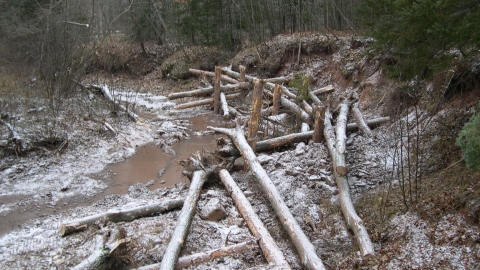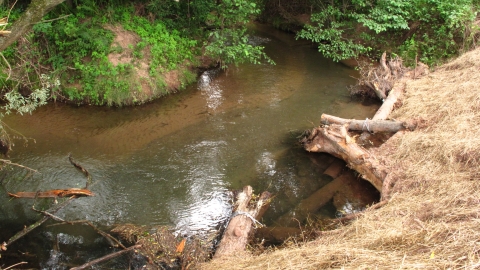What We Do
The National Wildlife Refuge System is a series of lands and waters owned and managed by the U.S. Fish and Wildlife Service. Working with others, to conserve wildlife and their habitats is at the heart of the refuge system. It drives everything we do, from the purpose a refuge is established, to the recreational activities offered there, to the resource management tools we use. Selecting the right tools helps us ensure the survival of local plants and animals and helps fulfill the purpose of the refuge.
In addition to restoration work on the refuge, we work in cooperation with private landowners in the 12,000 acre Whittlesey Creek watershed to protect and restore important riparian riparian
Definition of riparian habitat or riparian areas.
Learn more about riparian habitat through the U.S. Fish and Wildlife Service Partners for Fish and Wildlife program. Habitat restoration is directed at reducing sediment loading in Whittlesey Creek through placement of engineered log jams, road culvert replacement to allow for fish passage fish passage
Fish passage is the ability of fish or other aquatic species to move freely throughout their life to find food, reproduce, and complete their natural migration cycles. Millions of barriers to fish passage across the country are fragmenting habitat and leading to species declines. The U.S. Fish and Wildlife Service's National Fish Passage Program is working to reconnect watersheds to benefit both wildlife and people.
Learn more about fish passage and other in-stream habitat work. Reforestation of riparian areas is completed to reduce erosion and provide additional habitat for migratory birds. The refuge uses chemicals to control invasive species invasive species
An invasive species is any plant or animal that has spread or been introduced into a new area where they are, or could, cause harm to the environment, economy, or human, animal, or plant health. Their unwelcome presence can destroy ecosystems and cost millions of dollars.
Learn more about invasive species .
With the recent addition of a park ranger position at the refuge, we have begun to engage in more education and outreach programs with schools and the community. One of the key pieces of the U.S. Fish and Wildlife Service mission is that we are protecting these lands for the "continuing benefit of the American people". However, how can we expect people to help us protect these lands if they know nothing about them and have no connection to the lands themselves? Education, interpretation and community outreach are critical pieces in the fulfillment of our mission.
Management and Conservation
Refuges use a wide range of land management tools based on the best science available. The management tools used are aimed at ensuring a balanced conservation approach where both wildlife and people will benefit. At this refuge, we assist with the development and implementation of emerging science to prioritize and integrate all stream, floodplain, wetland and watershed restoration activities to maximize fish and wildlife benefits. The refuge emphasizes using existing sediment, hydrology and climate models and working with partners to determine priorities.
Our Services
Whittlesey Creek staff are stationed at the David R. Obey Northern Great Lakes Visitor Center along with U.S. Forest Service, National Park Service, Wisconsin Historical Society, Friends of the Center Alliance Limited and University of Wisconsin-Madison Extension. As an interagency center, we work along side our partners in the building to run and operate the center. With multiple organizations working in one building, we have a lot to offer visitors! Check out the visitor center website to learn more. Questions for our staff? Visit the contact us page.
Law Enforcement
U.S. Fish and Wildlife Service refuge law enforcement officers have a wide variety of duties and responsibilities. Officers help visitors understand and obey public land and wildlife protection laws. They work closely with state, tribal and other local government offices to enforce federal, state and refuge hunting and fishing regulations that protect migratory birds and other game species from illegal take. Other duties include maintaining refuge boundaries, participating in public events and maintaining relationships with neighboring landowners.
Law enforcement issues should be referred to the refuge manager at 715-246-7784, ext. 112.
To report violations:
- Call or email the National Wildlife Refuge TIPs Line at 1-844-FWS-TIPS (397-8477) or fws_tips@fws.gov
- Call the State of Wisconsin’s TIP hotline at 1-800-847-9367
- Call a Federal Wildlife Officer at 763-389-3323
Please provide the following information: what happened, where it happened, who was involved (including descriptions/names of person involved, vehicle information, names of other witnesses) and when it happened.


